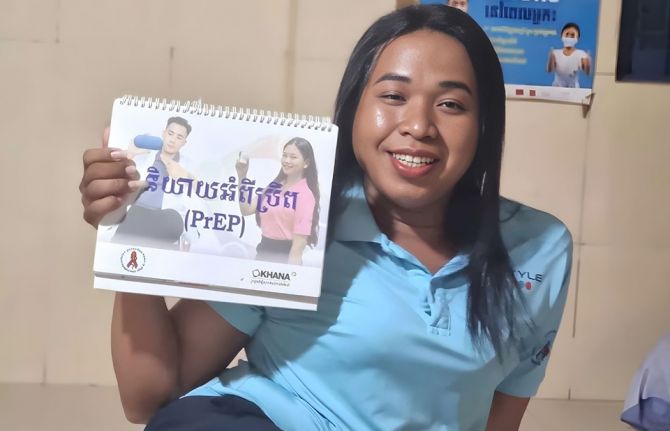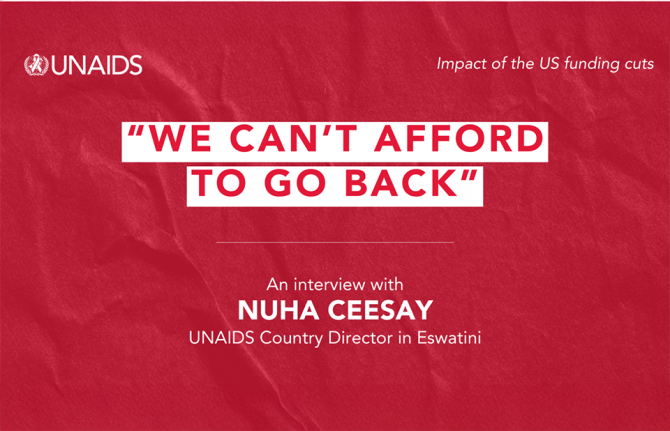
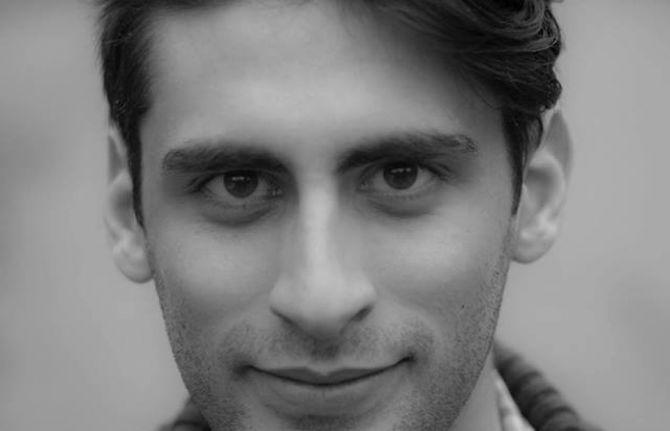
Feature Story
Love makes a family: UNAIDS commemorates International Day against Homophobia, Biphobia and Transphobia
16 May 2017
16 May 2017 16 May 2017This year’s International Day against Homophobia, Biphobia and Transphobia (IDAHOT) focuses on the family, including the role of families in the well-being of their lesbian, gay, bisexual, transgender and intersex (LGBTI) members and respect of the rights of LGBTI families.
UNAIDS has been a strong supporter of LBGTI equality and has been a champion of the cause within the United Nations system. To celebrate the diversity of families at UNAIDS, we have talked to LGBTI staff about what family means to them.
Shane Hebel
When I think of family I think of my chosen family, friends who became loved ones through our shared experiences, joys and trials. We support each other, we push each other to be our best selves, we help each other move. These people have taught me that families come in all forms and that love can exist boundlessly among those you choose to surround yourself with, even if they aren’t tied to you by blood.
Chris Mallouris
Family for me means safety, unconditional love and acceptance for who I am, acceptance when I succeed and acceptance when I fail. As we grow older, our family expands from those with whom we are linked genetically to those who come to our lives by mutual choice. In the last few years, it has been heart-warming to see LGBTI people in some regions of the world celebrate publicly their definition of family. But it has also been heart-breaking to see LGBTI people in other regions losing their families, being persecuted and having their lives threatened by those who should be there to protect them and love them unconditionally. Families protect each other, they don’t turn against one another for being born LGBTI.
Carlos Passarelli
When I met Marc, almost three years ago, I always acted as if his kids, his grandchildren, and his stepsons were his family, not mine. One day, Manon, his daughter, introduced me to a colleague of hers, presenting me as her “stepfather”. I must admit that I was touched by her spontaneity. Her three daughters, Marc’s grandchildren, also treat me as the partner of their grandfather, and it is very natural to them. And then I realized that Marc and I were more than a couple: we were part of the same family, including my own family in Brazil. And I felt good about that.
Alberto Stella
The family is the primary social context for growth development of the person in its wonderful diversity. My family has been growing along my journey: I found my son in Africa and my partner in central America and we got married in Argentina. Today, we are a family, a refuge that provides security, love and a real possibility of fully exercising human rights. No matter how the family is composed, what makes family functional is the strength of ties.
UNAIDS’ policy
Starting in 2009, UNAIDS actively promoted the equal recognition of marriages and unions at the United Nations system level. UNAIDS was one of the pioneers in extending benefits to staff members who entered a civil union or marriage recognized by a competent legislative authority, irrespective of the staff member’s nationality. The United Nations Secretariat and other entities later adopted a similar policy in 2014. UNAIDS was also one of the first United Nations organizations to establish a diversity policy. UNAIDS’ Policy on Diversity and Inclusion makes specific reference to same-sex partnerships and UNAIDS’ policy of zero tolerance for discrimination.
UNAIDS staff member
Family to me is my immediate family, but it’s also the many gay and lesbian friends I have made over the years. The two are essential to my life. I have the unconditional love of my parents, who accept me for who I am, a lesbian, but they stay silent about my life and lifestyle. That is why I feel a reassuring sense of community with my gay friends. At UNAIDS, the sense of acceptance has been overwhelmingly positive and I wish everyone could work in such an environment. No labels, no stigma.
UNAIDS staff member
A few months ago, I delivered training on sexual orientation and gender identity in western Africa. I shared with the participants my experience of coming out to my family in my twenties and then pursuing a life and a career. One of the participants asked me if there had been a nongovernmental organization that had helped me when I came out. The question caught me off guard. I realized that it presupposed that I had been rejected by my family and that I must have needed external help to survive. I replied that I did not need any help because as soon as I came out I was embraced, reassured and supported by my family at all times. This made me reflect on how fortunate I am to have my parents and siblings, to have been born in a time and in a place where that family was possible, and to have been resilient enough to come out to my family and to society without much fear. I know these factors are not a reality for all LGBTI youth worldwide, and for that we need to continue advocating for universal human rights, education, services and justice.
To celebrate IDAHOT 2017, UNAIDS has released a video message (https://youtu.be/DGbO0qt7EQo) by Michel Sidibé, UNAIDS Executive Director, on the diversity and importance of all families.
Mr Sidibé in the video statement said, “Families come in all shapes and sizes … we all have a responsibility to respect and protect one another.” He added, “Ending AIDS means we need to end the stigma and discrimination of lesbian, gay, bisexual, transgender and intersex people.”

Feature Story
Friends of UN Plus launched in Liberia
19 December 2012
19 December 2012 19 December 2012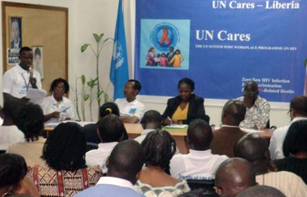
The launch of the ‘Friends of UN Plus’ at the UNAIDS Country Office in Monrovia. Credit: UNAIDS
The United Nations (UN) in Liberia has joined Mozambique, Swaziland, Rwanda and Ghana in launching the ‘Friends of UN Plus’ as part of its efforts to achieve a work environment that is free from stigma for all UN staff living with HIV and their families.
UN Plus is a global group of UN staff living with HIV which has more than 200 members worldwide from across different UN agencies. Its members advocate for issues that are of concern to staff living with HIV such as access to healthcare, ensuring no discrimination based on HIV status and maintaining confidentiality.
Despite the advocacy efforts that UN Plus has made to date, many staff members living with HIV still feel fearful of talking about their status. The Friends initiative, therefore, is meant to provide a supportive environment to staff living with HIV by all UN staff members regardless of their HIV status. It aims to be a forum through which the needs of HIV-positive staff and those caring for HIV-positive friends and family can be articulated and addressed.
The establishment of the ‘Friends of UN Plus’ was proposed and approved by the UN Theme Group in Liberia based on reports showing that 21 UN staff members tested positive between 2009 and 2012 out of 300. This HIV prevalence (17%) is significantly higher than the Liberia’s national HIV prevalence which currently is 1.5%.
The ‘Friends of UN Plus’ will implement various activities for staff living with HIV, including events and campaigns to sensitize the UN community around HIV-related stigma and discrimination and support groups for staff living with HIV. The group will also partner with the national network of people living with HIV to address issues that are of concern to staff living with HIV such as access to HIV treatment.
The launch of the ‘Friends of UN Plus’ took place at the UNAIDS Country Office in Monrovia and was attended by more than 70 guests including the Resident Coordinator (a.i.), the UNAIDS Country Coordinator, Heads of UN Agencies in Liberia, representatives from the National AIDS Commission and civil society organizations as well as family members of UN staff.
Sensitizing UN staff members on all forms of HIV-related stigma and discrimination will help our colleagues living with HIV to overcome their fear of potential repercussions of disclosing their HIV status at work
Dr Betru Woldesemayat, UNAIDS Country Coordinator in Liberia
The UN Resident Coordinator (a.i.), Madam Esperance Fundira, described the initiative as a key mechanism through which the UN can renew its commitment to provide financial and human resources to staff living with HIV. According to her, it provides an opportunity to strengthen the anti-stigma campaign in Liberia, and work towards a stigma-free work environment for UN staff.
Dr Betru Woldesemayat, UNAIDS Country Coordinator in Liberia, termed the launch of the Friends of UN Plus as a significant milestone in the AIDS response in Liberia, especially in its on-going efforts to reduce stigma and discrimination within and outside of the UN. “Sensitizing UN staff members on all forms of HIV-related stigma and discrimination will help our colleagues living with HIV to overcome their fear of potential repercussions of disclosing their HIV status at work,” he said.
Prior to the launch, UNAIDS and UN Cares met with the National AIDS Commission and a national network of PLHIV (LIBNET+) to identify ways to reach out to more employees living with HIV in Liberia, providing them with support and creating an enabling environment for them and their families.
External links
External links
Related

Feature Story
UNAIDS staff member carries Olympic Flame in Calgary
20 January 2010
20 January 2010 20 January 2010
Eric Sawyer handing over the Olympic flame.
Credit: UNAIDS
UNAIDS staff member Eric Sawyer carried the Olympic Flame in Calgary, Canada on 20 January as part of the 2010 Olympic Torch Relay leading up to the Winter Olympic Games in Vancouver, to be held from 12-28 February.
Prior to working for UNAIDS he founded three HIV organizations in the US, including ACT UP/New York -- an international advocacy group working to defend the rights of people living with HIV. He has been living with HIV for the past 30 years.
By working together in the spirit of the core values of the Olympic Movement—friendship, excellence and respect—we can be a force for positive change.
Michel Sidibé, UNAIDS Executive Director
Speaking about being chosen as an Olympic torchbearer, Mr Sawyer said, “I am a long term survivor of HIV and have been fortunate to have been able to buy almost 30 years of life after becoming symptomatic with HIV in 1981, because I have had access to the latest medical treatment and care. The fact that I am still able to run a segment of the relay is a clear example of the need to provide everyone living with HIV with the information, treatment, care and support.”
Mr Sawyer is also member of UN Plus, the UN system-wide advocacy group of staff living with HIV.
UNAIDS and the International Olympic Committee (IOC) has a long-standing partnership to enhance the role of sports organisations in the AIDS response. This joint venture was formalized in a Memorandum of Understanding signed in 2004. The two organizations have also collaborated in efforts to raise HIV awareness with coaches, athletes and sports personalities around the world.
Praising the work of the IOC, UNAIDS Executive Director Michel Sidibé stressed the importance of partnerships like this one for the AIDS response, saying “By working together in the spirit of the core values of the Olympic Movement—friendship, excellence and respect—we can be a force for positive change.”
Jacques Rogge, the President of the IOC, said, “The IOC and UNAIDS both try to reach out to as many young people as possible. It is our common goal to use sport as a powerful tool in the education about and the prevention of HIV and AIDS across the globe.”
For the Vancouver Games, UNAIDS has helped develop HIV education, prevention and awareness packages that will be distributed to volunteers, workers and athletes alike. In addition to literature that educates individuals about the risks of HIV transmission, the packages contain male condoms as well as information on safer sex.
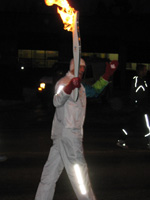
Eric Sawyer is a staff member of UNAIDS and has been living with HIV for 30 years.
Credit: UNAIDS
“As a person living with HIV, I am glad to see that the prevention packets are being distributed to all involved in the Olympic Games experience. Just as a downhill ski coach provides his athletes with information, training, goggles and a helmet to safely ski down a slalom run, information and commodities must be provided to everyone so that when they engage in sexual relations they are protected from sexually transmitted infections and unplanned pregnancies.”
The IOC has asked UNAIDS to nominate people living with HIV as bearers of the Olympic flame in the relay to help break down the barriers of stigma and discrimination.
It is our common goal to use sport as a powerful tool in the education about and the prevention of HIV and AIDS across the globe.
Jacques Rogge, President of the IOC
Dhamiri Mustapha, a young Tanzanian woman living with HIV, was one of the 80 dignitaries who carried the Olympic Flame in Dar Es Salaam, Tanzania, ahead of the 2008 Summer Olympic Games in Beijing. In the run up to the 2004 Summer Olympic Games in Athens, UNAIDS nominated 31-year-old South African Musa Njoko to participate in the Olympic Torch Relay in Cape Town.
The partnership between UNAIDS and the IOC was particularly successful during the recent 2008 Summer Olympic Games in Beijing. The “Play Safe – Help Stop HIV – Play your part in protecting the world around you” campaign for the Beijing Games was jointly planned and executed by the IOC, the Beijing Organizing Committee for the Games of the XXIX Olympiad and UNAIDS. UNAIDS mobilized nine UN agencies, the Red Cross, Marie Stopes International as well as groups of people living with HIV to train 7,000 Olympic volunteers on HIV prevention and countering stigma and discrimination.
UNAIDS staff member carries Olympic Flame in Calg
Key populations:
Partners:
International Olympic Committee
Press centre:
UN trains Olympic volunteers on AIDS awareness
'Positive' role model Musa Mjoko to carry Olympic Torch
Feature stories:
UNAIDS and International Olympic Committee strengthen partnership (26 Oct 2009)
Carrying the Olympic flame for PLHIV in Tanzania (18 April 2008)
When red ribbon meets Olympics (11 Aug 2008)
External links:
Related

Feature Story
Friends of UN Plus in Swaziland, Mozambique
21 September 2009
21 September 2009 21 September 2009
President of Swaziland AIDS Support Organization (SASO) Mr. Vusi Matgerula addressing the event on behalf of the people living with HIV movement in Swaziland. Credit: UNAIDS/G.Williams
Strengthening efforts towards a stigma-free work environment for United Nations staff living with HIV and their families, UN Plus has launched a new Friends of UN Plus initiative in Swaziland. Keeping up the momentum to break down barriers and silence around HIV in southern Africa, this will be followed by the launch of a similar initiative in Mozambique on September 23.
Friends of UN Plus is a novel initiative by UN Plus, an advocacy and support group comprising staff members who are living with HIV. UN Plus membership in the southern African region has doubled in the last year but many staff members living with HIV still feel fearful of disclosing their status. Although UN Plus has a non-disclosure policy, the reluctance to disclose HIV status reflects high stigma levels in society. The Friends initiative, therefore, is meant to provide a supportive environment to those who have reservations about being openly associated with UN Plus. It aims to be a forum through which the needs of HIV-positive staff and those caring for HIV-positive friends and family can be articulated and addressed.

Dr. Jama Gulaid, UNICEF Representative and UN HIV/AIDS Theme Group chair for Swaziland addressing the launch of Friends of UN+ in Mbabane, Swaziland on 17 September 2009. Credit: UNAIDS/G.Williams
''Today was a bold and decisive step we took for us to launch this initiative. I am so glad that staff will now have a platform to share safely and a space for outreach. It does not hurt to help and to reach out. We can all do something to make life better for those in our families, offices and communities living with HIV," said an HIV positive staff member of the UN in Swaziland.
The country launches are designed to highlight workplace rights and continue the ongoing dialogue on human rights, treatment needs and challenges of people living with HIV. Through training, meetings, treatment literacy sessions and related activities the initiative aims to educate staff members about UN Plus’ contribution towards reduction of stigma and discrimination, promotion of social acceptance and increase of social, legal and leadership commitment for HIV at the UN system workplace.

Group photo of participants at the launch of Friends of UN Plus in Mbabane, Swaziland on 17 September 2009. Credit: UNAIDS/G.Williams
The Swaziland launch included a panel discussion where representatives of people living with HIV answered questions from the local press on issues of equality and rights. Two members of the local media joined the panel to share their experiences of how they cover stories of people living with HIV in a meaningful way.
Friends of UN Plus will operate in tandem with UN Cares, the UN HIV in the workplace programme, the UN Wellness Program and other workplace initiatives and agency-specific programmes that exist at country levels.
Friends of UN Plus in Swaziland, Mozambique
Partners:
Feature stories:
New UN Plus groups in South Africa and Lesotho (16 September 2009)
UN Secretary-General meets HIV positive UN staff members (20 May 2009)
UN Secretary-General opens UNPlus exhibition (01 December 2007)
Multimedia:
UN Plus meets UN Secretary-General at UN Headquarters in New York: photo gallery (20 May 2009)
External links:
Unplus on Facebook
Unplus on Twitter
UN Cares
Publications:
UN System HIV Workplace Programmes HIV Prevention, Treatment and Care for UN System Employees and Their Families (pdf, 1.48 Mb.)

Feature Story
UN Cares: UN system workplace programme on HIV launched in Asia Pacific
02 December 2008
02 December 2008 02 December 2008
(from right) Mr Geoff Manthey (Regional Programme Advisor); Mr Robert Sutherland (UN+ representative); Ms Heyzer (Executive Secretary, ESCAP) and Mr Prasada Rao (UNAIDS Regional Support Team Director) at the World AIDS Day launch. United Nations Convention Center, Bangkok, Thailand. 1 December 2008Credit: UNAIDS
Marking World AIDS Day, UN staff from the Asia Pacific region launched a “UN Cares” regional programme yesterday in Bangkok.
Robert Sutherland, representative of UN Plus in Asia and the Pacific, delivered a speech at the launch in which he acknowledged his appreciation of the leadership of UN agencies in delivering on AIDS, and appealed for even more support for creating an environment free of stigma and discrimination within UN.
After the lighting of two red candles – which according to Asian tradition marks a beginning – the UN Under Secretary-General and Executive Secretary ESCAP, Ms. Noeleen Heyzer delivered her address. She stressed the role of a coordinated “one UN” to ensure that the UN Secretary-General’s commitment to UN Cares is realized in the region. She said, “This year’s World AIDS Day theme ‘Lead, Empower, Deliver’ allows us to reflect on our roles as UN leaders. With this theme, let us pledge to contribute to our own staff welfare when it comes to HIV and AIDS by ensuring time and support needed to meet a specific set of ten minimum standards of UN Cares by the end of 2011.”
On the occasion, the UN Cares Asia-Pacific Regional Coordinator, Dr Lazeena Muna-McQuay was introduced. Dr Muna-McQuay is jointly hosted by UNFPA, ESCAP and UNAIDS RST.
Two UN Cares videos were screened during the programme including the speech of Secretary-General during the official launch of global UN Cares programme and the “voices of support from the field”.
The launch closed with a commitment, as iterated by the Secretary-General, to make UN Cares ten Minimum Standards achieved by all UN agencies by the year 2011.
UN Cares
The UN Cares programme has been developed through interagency consultation between UNAIDS Cosponsors and other. It is a single harmonized programme available to UN system personnel and their families in all entities and all duty stations, designed to help them to access their rights defined in the 1991 United Nations HIV/AIDS Personnel Policy and in the ILO Code of Practice on HIV/AIDS and the World of Work and recognize their individual responsibilities related to HIV. The UN Cares global programme was launched by the Secretary-General in May this year in New York.
UN Cares: UN system workplace programme on HIV la

Feature Story
UN Secretary-General opens UNPlus exhibition
01 December 2007
01 December 2007 01 December 2007
Secretary-General Ban Ki-moon (fifth from right)
and his wife Yoo Soon-taek (fourth from right) with
members of UNPlus—the UN System HIV Positive
Staff Group, at the opening of the UNPlus
photographic exhibition and launch of their
calendar, in observance of World AIDS Day 2007.
Photo credit: UN/Paulo Figueiras
In observance of World AIDS Day 2007, Secretary-General Ban Ki-moon and his wife Yoo Soon-taek opened a photographic exhibition entitled "UN Plus" at the United Nations headquarters in New York with the members of UNPlus - the UN System HIV Positive Staff Group.
UNPlus also marked the occasion with the launch of their new calendar, which features photos of UN staff ‘living positively’ and which has been distributed around the world.
UNPlus was initiated in March 2005 by a group of UN staff members living with HIV, with the support of the UNAIDS secretariat, to create a more enabling environment of all HIV-positive staff members, irrespective of the level of disclosure of their HIV status. UNPlus aims to create an organized and effective voice for people living with HIV within the United Nations system that challenges stigma and discrimination, and contributes to the development of and improvement of existing policies on HIV among United Nations agencies.

Secretary-General Ban Ki-moon (second from right),
and members of UNPlus tour the UNPlus
photographic exhibition, in observance of the
World AIDS Day.Photo credit: UN/Paulo Figueiras
UN Secretary-General Ban Ki-moon first met UNPlus in May 2007, as part of the 61st session of the General Assembly, to discuss the opportunities and challenges that UN positive staff face at work.
Describing his first meeting with the group as “one of the most moving experiences” of his life, Secretary-General Ban Ki-moon vowed to step up efforts to eliminate the stigma that still surrounds people living with AIDS in so many countries.
Mr. Ban said he was touched by the courage shown by the members of UNPlus, as well as the directness with which they spoke about their lives.
Links:
More on World AIDS Day
UN Plus meets UN Secretary-General (May 2007)
Visit UNplus web site
Related

Feature Story
Scouts get the HIV message
16 August 2007
16 August 2007 16 August 2007As part of the international scout jamboree held in Britain over the summer, UNAIDS ran workshops on HIV prevention, personal responsibility in HIV transmission and respect for the human rights of positive people.

40,000 teenagers from all over the world attended
this year's world scout jamboree.
This summer, residents of Chelmsford, a town in eastern England, woke up to an unusual array of sights and sounds.
The banging of early morning drums and excited screeches of hundreds of teenage boys and girls filled the air – this was the international scout jamboree, and the 40,000 teenagers attending from all over the world wanted to make sure everyone knew it!
For UNAIDS staff attending the jamboree to run special workshops on HIV prevention, personal responsibility in HIV transmission and respect for the human rights of positive people, it was a bit of an eye opener. “We would look at each other and think: ‘Are you as lost as I am?’ ” laughs Bhatupe Mhango, coordinator of UN Plus – the UN system-wide group of staff living with HIV, who took part in the event with Alex McLelland, an intern with UNAIDS, in the Civil Society Partnerships Unit. “But we became hooked on those sessions every morning. I still hear them drumming and humming in my ears,” she says.
This was a particularly significant jamboree, as it marked the centenary of scouting and 40,000 teenagers attended from all over the world. UNAIDS had an area in the Global Development Village, a section dedicated to workshops on human rights and the work of UN agencies.
“The scouts as a movement has so much potential to mobilize towards the HIV response,” says Alex, who is studying for a degree in International Development at York University in Toronto, Canada . “They are eager to get further engaged. With approximately 28 million young people as members you can see the possibilities.”
Bhatupe and Alex planned and ran five workshops on the topic “HIV Sensitisation and Safeguarding Human Rights.” One of the UNAIDS objectives was to initiate a dialogue on the need for a policy to work with HIV positive scouts, and for UN Plus to look for possible partnerships.
“We established that there are some Positive scouts in several countries, particularly Africa, and UN Plus could foster a partnership with them,” says Bhatupe.
Over three days, he and Bhatupe spoke to youngsters from Norway , Germany, Italy, Chile, Brazil, Denmark, Britain, Turkey and Finland.
In spite of the big subject, it was all very informal. “Most of the workshops took place outside because the young scouts wanted to lie on the grass,” says Bhatupe. She and Alex shared their personal stories as people living with HIV. Scouts asked questions about stigma, treatment, nutrition guidelines and human rights issues for people living with HIV.

Bhatupe Mhango, coordinator of UN Plus, during a
live radio interview with the jamboree radio station,
promoting the workshops and encouraging scouts to
be aware of the means to protect themselves from
HIV transmission.
Bhatupe also did a live radio interview with the jamboree radio station, to promote the workshops and encourage scouts to be aware of the means of protecting themselves from HIV transmission.
There were the obvious drawbacks of talking about sex to teenage boys: “A memorable moment was watching young, Italian boys laughing hysterically at a UNFPA-led workshop we participated in, demonstrating male condoms using bananas,” says Bhatupe.
But many of the scouts showed real insight and understanding into the issue – Alex and Bhatupe were delighted by a group of 14-16 year old girls from Chile, who were well informed about HIV, AIDS and sex, having studied the subject at school. The girls held a debate on abstinence versus early sex.
“The maturity of the debate convinced me that the message on HIV prevention and empowerment of young girls is getting across,” says Bhatupe.
The girls were evenly divided - indicating that no one method is the obvious solution to managing yourself as a young woman in a relationship.
The views expressed included:
“If I love my boyfriend and I trust him…and if he has gone for an HIV test and tells me he is HIV negative, why should I not express my feelings for him and have sex with him? If that is what I want to do, I will just go ahead…if you love someone, you can not put controls on what you can do with that person.”
“For me I say no. I have to wait until I am married before I have sex. It is scary. I am scared of getting HIV or falling pregnant so the best thing to do is to wait.”
For Bhatupe and Alex, the UNAIDS messages were getting across: prevention, personal responsibility in HIV transmission, the need for more support and less stigma for positive people.
Alex was encouraged to see so much focus on AIDS at the jamboree.
“There were other workshops from UNFPA, UNICEF, UNESCO, as well as the South African and Ugandan Scout associations. The Girl Guides did a big presentation about HIV. The ILO discussed child labour and vulnerability to HIV.
“There’s a quite a lot of awareness among the Scouts. It was gratifying to see so much going on,” he said.
Links:
Visit the world scout jamboree web site
More information on young people and HIV


